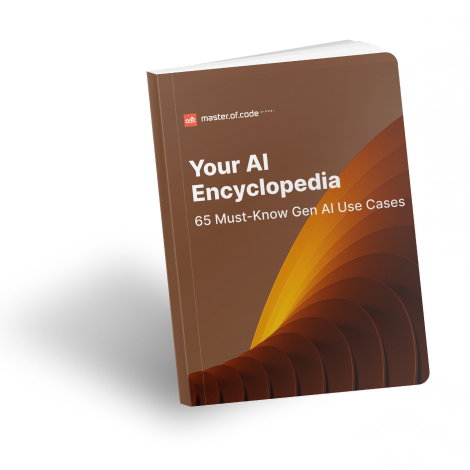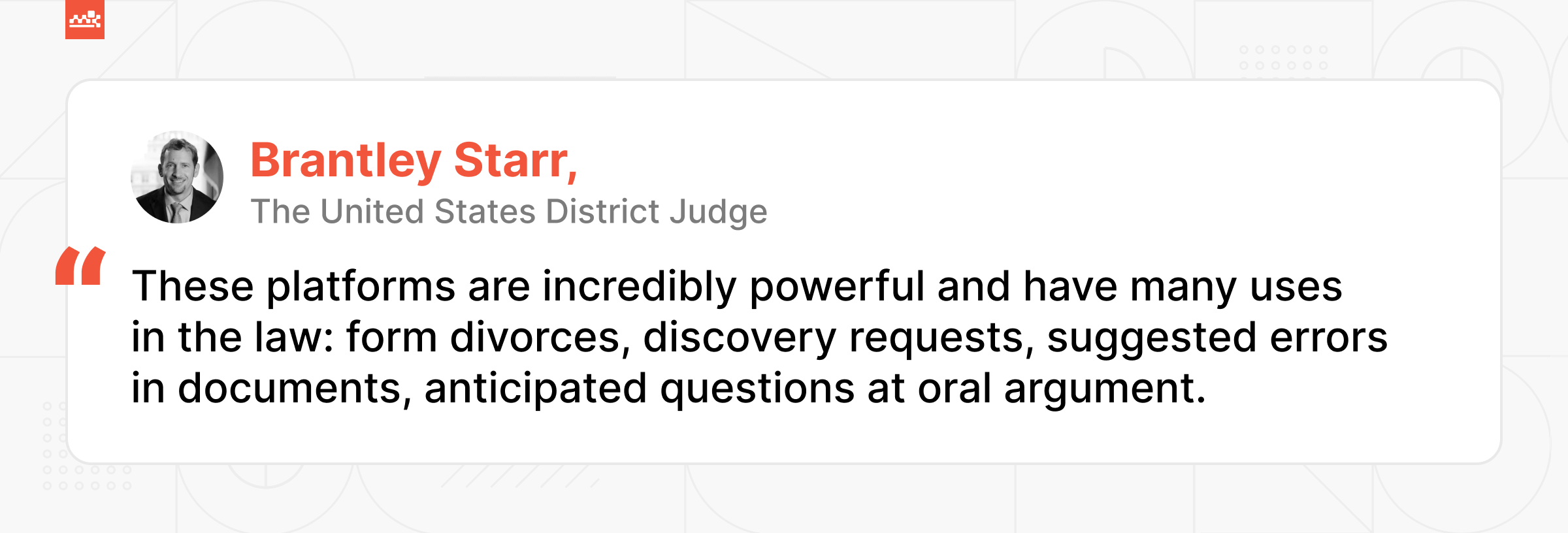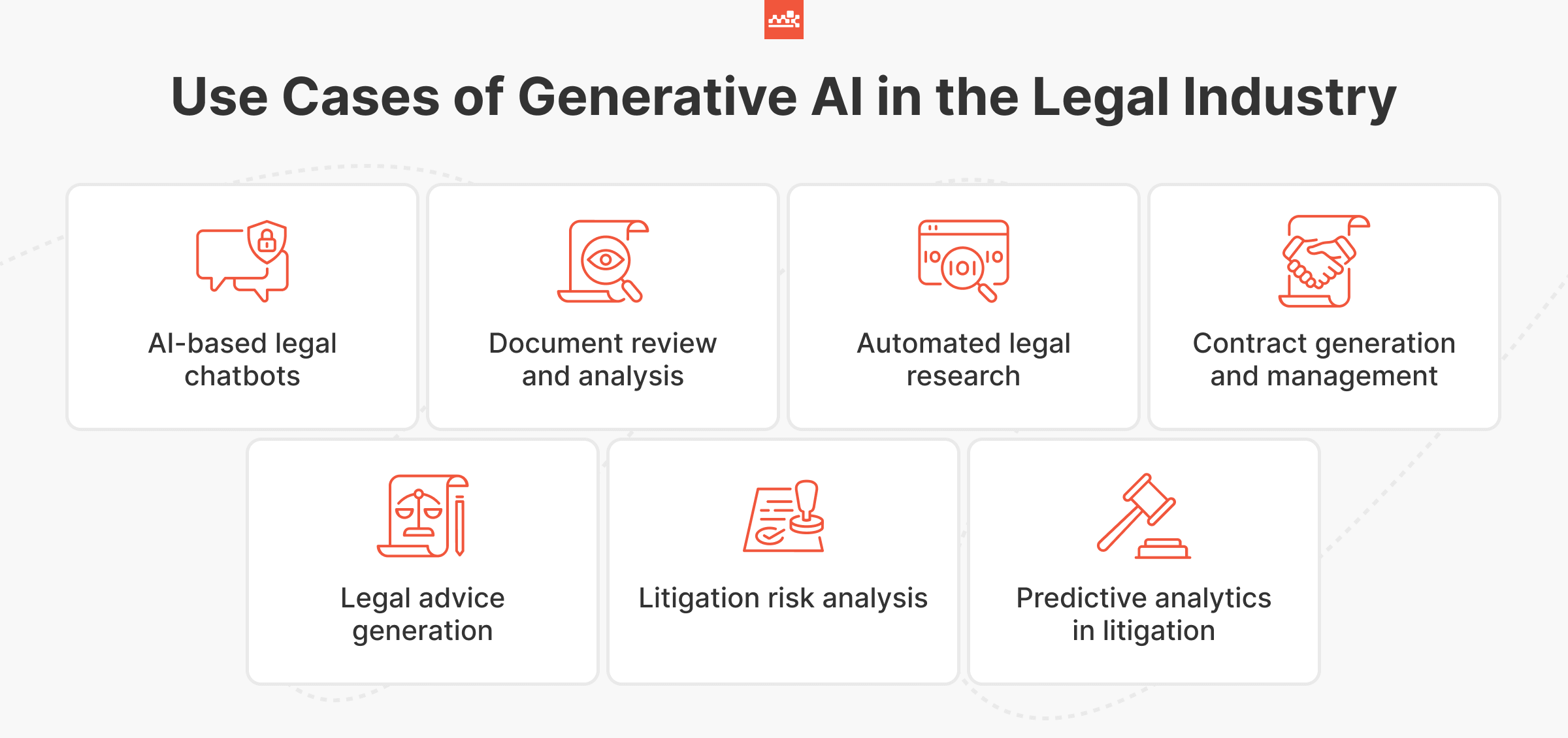Improve your Generative AI knowledge with 65 use cases for effective industry applications.

Based on the Wolters Kluwer Future Ready Lawyer Survey results, the majority of lawyers emphasize the importance of accessing the latest tools and innovations. And artificial intelligence ranks among the top technological trends in the legal landscape. In fact, 73% of attorneys anticipate integrating it into their work this year. It’s unsurprising, given the advantages they’ve already witnessed from incorporating AI.

Indeed, Generative AI in law has significantly enhanced the day-to-day operations of 87% of jurists. District Judge Brantley Starr highlights its versatility, stating, “These platforms are incredibly powerful and have many uses in the law: form divorces, discovery requests, suggested errors in documents, anticipated questions at oral argument.” While a responsible approach to technology usage is essential, the substantial benefits for the sector cannot be overlooked.
To underscore the value of Gen AI, we provide an overview of existing solutions, practical use cases benefiting practitioners, and recommendations for its adoption. Delve into the article to prepare for the next wave of innovation in the legal industry.
Table of Contents
What Makes AI Valuable to the Law Sector?
The first consideration when evaluating any technology is its advantages. Interestingly, 43% of surveyed lawyers view artificial intelligence as an opportunity. So what are the Generative AI benefits for enterprises that ignite such enthusiasm among law experts?
The primary advantage lies in optimizing routine operations (e.g., contract drafting, document reviews, etc.). In fact, Goldman Sachs estimates that 44% of current legal tasks could be automated by AI. The amount of manual work lawyers and other experts face each day is incredible. Thus, Gen AI has the potential to become an irreplaceable instrument in their everyday duties.
Another crucial factor is the heightened efficiency of workers. Attorneys can now complete a larger number of operations in a shorter period of time. This is paramount for specialists whose time is one of the most valuable assets. Notably, 85% of law firms and 84% of legal departments anticipate greater technology usage for improved productivity. Thus, the benefit extends beyond individual use to evolve into an integral tool across organizations.
Artificial intelligence can also enhance access to juridical resources. It swiftly pinpoints necessary references, assesses them, and provides required data. AI-powered solutions alleviate pressure on legal professionals and improve their decision-making. Moreover, fast identification of high-quality sources enables experts to elevate performance results.
Generative AI in law firms improves client services. Faster and more efficient work, coupled with higher accuracy, elevates customer satisfaction and retention. Furthermore, with automation, more time is dedicated to communication with subjects, contributing to organizations’ enhanced reputation.
As evident, artificial intelligence with its potential can transform the domain and boost service quality. However, realizing these benefits requires addressing LLM limitations. Let’s now delve into the list of challenges to prepare you for effective AI use.

Potential Pitfalls of Implementing AI in the Legal Field
Did you know that 25% of lawyers perceive Generative AI in legal operations as a probable threat? Undeniably, the technology is relatively young, prompting concerns among specialists regarding its adoption. Yet, with a responsible approach, most if not all of the following issues can be mitigated:
Liability and Accountability
In AI-assisted decision-making, it remains unclear who bears responsibility for faulty advice. Clear guidelines and risk management frameworks guarantee answerability with human law professionals. This way institutions ensure they can interpret and apply AI recommendations appropriately.
Data Privacy and Security
Crucial in a lawyer’s work, client safety involves safeguarding sensitive information. Law establishments and legal departments can address this challenge through advanced cybersecurity measures. Strict compliance with data protection laws and regular training for employees handling private records are also essential.
Ethical and Bias Concerns
Artificial intelligence systems may reflect biases in educational materials, potentially leading to unfair outcomes. To mitigate this, models should be trained on diverse, unbiased datasets, governed by ethical guidelines tailored for the field. Plus, periodic reviews by experts can identify and rectify any prejudices in AI-generated advice or decisions.
Overall, effectively integrating AI in the sector requires a multifaceted approach. Firstly, dynamic regulatory frameworks should evolve with technological advancements. Secondly, maintaining human oversight in decision-making prevents overdependence on the tool. Legal professionals must be equipped with skills to work alongside Gen AI, understanding its outputs. Lastly, transparency and building trust in AI-assisted processes are essential for ethical practice and public acceptance. These steps are key to harmonizing the technology use with judiciary standards and societal expectations.
Artificial Intelligence in Action within the Legal Industry
Now that we have covered both the pros and cons of technology usage in the law domain, let’s explore what exactly can Gen AI do for legal professionals.

AI-Based Legal Chatbots
Generative AI-powered bots serve two main functions in the sector. For clients, they automate initial interactions, quickly addressing basic inquiries. This improves user experience, offering immediate responses and guidance. Chatbots efficiently triage cases, directing customers to the right services. Moreover, almost 80% of law firms predict more self-service by clients in the next three years pointing to the growing importance of such solutions.
Internally, these Gen AI-based assistants aid legal specialists by fetching relevant case law or documents swiftly. They assist in preparing for client meetings by summarizing necessary details. Bots help in managing schedules and deadlines, ensuring no important task is overlooked. Additionally, the tools facilitate preliminary analysis, providing quick insights. Such support in routine tasks greatly enhances workflow and productivity. Chatbots are becoming integral in modern legal operations, significantly aiding professionals in various aspects of their work.
Document Review and Analysis
AI tools swiftly analyze vast volumes of documents. They identify relevant information, reducing the manual examination workload for lawyers. This efficiency supports more accurate and timely analysis of legal papers. Gen AI also enhances precision in identifying key issues and clauses.
Automated Legal Research
AI streamlines the process of finding relevant judicial precedents. It quickly scans through databases, saving hours of manual search. This allows lawyers to focus on strategic aspects of cases. Furthermore, AI-driven research tools ensure comprehensive legal information retrieval.
Contract Generation and Management
Generative AI-powered solutions automate drafting and managing complex legal contracts. They ensure consistency and compliance with relevant laws and regulations. Such tools also track changes, deadlines, and obligations in agreements. As a result, law experts reduce errors and improve contract administration efficiency.
Legal Advice Generation
Generative AI rapidly analyzes case law and statutes to provide initial insights on the topic. This assists in quickly addressing straightforward queries, enhancing efficiency in legal practice. Moreover, such AI tools are crucial for managing high volumes of routine inquiries.
The AI-driven recommendation complements the deeper analysis provided by legal professionals. It allows for more focused use of lawyer time on complex issues. Furthermore, the integration of technology into customer-facing services significantly improves client satisfaction by providing prompt and accurate initial consultations.
Predictive Analytics in Litigation
Generative AI forecasts the case outcomes by evaluating past information patterns. Such a function provides attorneys with strategic, data-informed insights for lawsuit preparation. It directs efficient use of resources in legal battles, enhancing tactical decision-making in court.
Litigation Risk Analysis
Artificial intelligence assesses the potential hazards and results in court cases. By scrutinizing previous proceeding histories, it anticipates possible legal hurdles. As a result, lawyers can develop more robust tactics. Overall, the AI’s risk assessment encourages anticipatory strategy formulation in disputes.
Inspiring Success Stories of AI in the Legal Market
The use cases we’ve identified sound promising and impactful. But the reality is even more fascinating. Here are the 3 top examples of Generative AI in the law domain you need to know about.

AI Supervisory Agents
In their recent article, Stanford University explored AI supervisory agents in a case study. The organization highlighted the tools’ role in bridging the technology-human oversight gap. These assistants, integrating guardrails and legal analysis, capture the nuances of the profession. They function as monitors of real-time interactions and offer triaging capabilities, channeling decision-making to human experts.
Acting as advanced control mechanisms, agents ensure AI’s responsible use and regulatory compliance. The design is tailored for tasks such as ensuring adherence to existing guidelines. This is pivotal for safely deploying AI in sensitive areas where strict professional standards, like attorney-client privilege, are paramount.
OpenJustice: Your Guide to Legal FAQs
OpenJustice is a specialized Generative AI tool designed for legal tasks. It combines natural language processing with analysis to deliver in-depth, reliable answers to law-related questions. With this mechanism, it can address the limitations of general LLMs like ChatGPT. Initially, its prototype will be improved through collaborations with law schools, firms, scholars, and other organizations, and then it will be open to the public.
The instrument aims to enhance transparency, verifiability, and accuracy in legal information. It will provide multiple outputs for domain queries and improve AI’s ability to apply law to facts. OpenJustice could significantly assist self-represented litigants and public interest lawyers, as well as inspire new research methodologies among attorneys.
Wrapping Up
We’ve explored various use cases and examples of Gen AI in the legal sector, revealing its impressive potential. It’s not surprising that 75% of professionals are ready to strategically invest in technology, with over half of law firms and departments planning to increase their investment in the coming years. Given this growing trend, it’s worth evaluating how such tools could transform your own legal practice.
Are you considering using artificial intelligence in your work? If so, Master of Code Global could be your ideal partner in this technological journey. As a leading provider specializing in Generative AI, we offer a range of services including solution development, LLM fine-tuning, consultations, maintenance, and integration. We’re committed to addressing the unique needs of each client.
Let’s discuss your pain points and address them together. Improving legal operations and client experience has never been simpler.
Don’t miss out on the opportunity to see how Generative AI can boost your legal advice and enhances subjects experience






